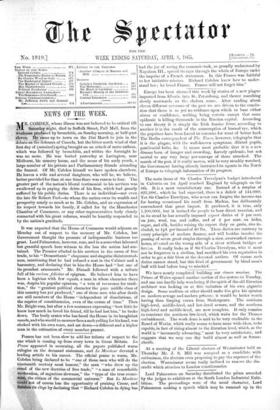The main items of Sir Charles Trevelyan's budget introduced in
Calcutta on 1st April reached England by telegraph on the 6th. It is a most unsatisfactory one. Instead of a surplus of 823,2881., which he had expected, there is a deficit of 144,0001. Yet Sir Charles Trevelyan, who never can forgive the income-tax for having occasioned his recall from Madras, has deliberately surrendered that great impost. It produced, it is true, only 1,200,0001., but it trained the people to bear direct taxation, and in its stead he has actually imposed export duties of 3 per cent. on jute, wool, tea, and coffee, and of 2 per cent. on hides, sugar, and silk, besides raising the export duty on grain, rice in- cluded, to 44d. per'niaund of 80 lbs. These duties are contrary to every principle of modern finance, and will besides involve the passing of seven great staples through a slow, overworked custom- house, situated on the wrong side of a river without bridges or ferries. It really looks as if Sir Charles Trevelyan, who it must not be forgotten is a civilian, had sacrificed his own reputation in order to get a fair blow at the detested settlers. Of course such duties cannot stand, but this kind of government by blind man's buff will lead before long to mischief.






























